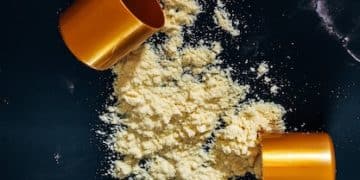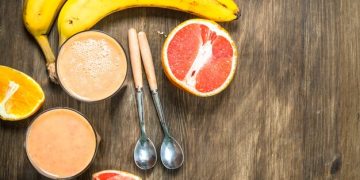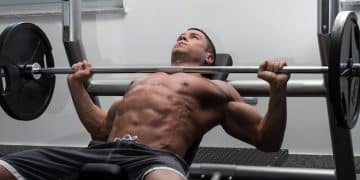Vegan Bodybuilding Nutrition: 30g Protein Per Meal Guide
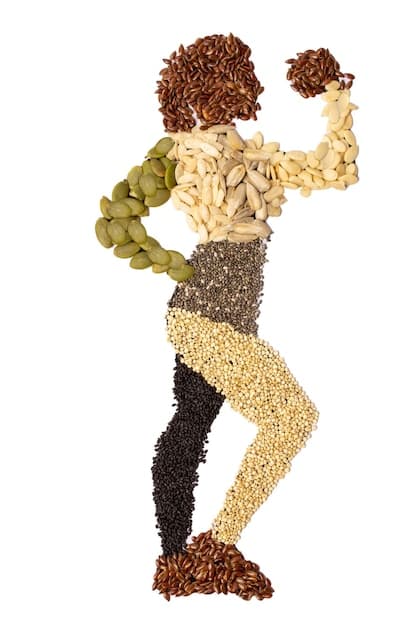
Achieving optimal muscle growth and recovery on a vegan diet for bodybuilding necessitates a strategic approach to protein consumption, with a targeted intake of at least 30 grams of protein per meal being a crucial cornerstone for maximizing gains and supporting rigorous training demands, while emphasizing diverse plant-based sources for comprehensive nutrient intake.
Embarking on a vegan bodybuilding journey presents unique nutritional considerations, chief among them optimizing protein intake for muscle synthesis. This comprehensive guide delves into how to consistently achieve vegan bodybuilding nutrition: the complete guide to 30 grams of protein per meal, ensuring your plant-based diet fully supports your strength and muscle-building goals.
Understanding protein needs for vegan bodybuilders
For any bodybuilder, protein stands as the cornerstone of muscle growth and repair. For those pursuing a vegan lifestyle, ensuring adequate protein intake becomes a more nuanced, yet entirely achievable, endeavor. The key lies not just in quantity, but in the intelligent selection and combination of plant-based protein sources.
Traditional bodybuilding often emphasizes animal proteins for their complete amino acid profiles. However, a well-planned vegan diet can provide all essential amino acids necessary for robust muscle development. This section will explore the specific protein requirements for vegan bodybuilders and how to meet them effectively.
Protein quality and complete amino acids
The concept of “complete protein” refers to a protein source that contains all nine essential amino acids in sufficient quantities. While most animal proteins are complete, many plant proteins are not. This doesn’t pose an insurmountable challenge for vegan bodybuilders.
- Complementary Proteins: By combining different plant protein sources throughout the day, vegans can easily achieve a complete amino acid profile. Examples include rice and beans, or hummus and whole-wheat pita.
- Sufficient Intake: The total amount of protein consumed over 24 hours is more critical than consuming complete proteins at every single meal. The body maintains an amino acid pool, drawing from it as needed.
- Quality Sources: Focus on whole, unprocessed plant foods that are naturally rich in protein and other vital nutrients.
Research consistently shows that athletes adhering to well-planned vegan diets perform comparably to their omnivorous counterparts, dispelling myths about protein deficiencies. The focus shifts from single-source completeness to dietary diversity.
Recommended daily protein intake
While general guidelines suggest 0.8 grams of protein per kilogram of body weight for sedentary adults, bodybuilders require significantly more. For muscle growth and repair, a range of 1.6 to 2.2 grams of protein per kilogram of body weight is often recommended. This translates to a substantial daily intake that must be distributed strategically across meals.
Meeting this increased demand on a vegan diet requires mindfulness and a diverse intake of plant-based protein sources. It’s not about counting every single gram but rather ensuring a consistent intake of protein-dense foods throughout the day, with a specific focus on hitting key targets per meal to optimize muscle protein synthesis.
The goal is to provide a steady supply of amino acids that can be utilized efficiently for muscle repair and growth. This proactive approach helps prevent muscle breakdown and supports recovery from intense training sessions.
Achieving 30 grams of protein per meal: practical strategies
The target of 30 grams of protein per meal is not an arbitrary number. Studies suggest that this amount can effectively stimulate muscle protein synthesis (MPS) in adult athletes. For vegan bodybuilders, hitting this target consistently requires strategic meal planning and smart food choices.
This section outlines practical approaches to ensure each of your meals contributes significantly to your daily protein goals without relying on a limited range of foods. Variety is key, not only for nutrient diversity but also for palatability and adherence to the diet.
Strategic food combinations
Combining different plant-based protein sources at each meal is an effective way to reach the 30-gram threshold. This approach also helps ensure a complete amino acid profile, given that many individual plant proteins may be limiting in one or more essential amino acids.
- Legumes and Grains: A classic and highly effective combination. For example, a large serving of lentil soup with a side of whole-grain bread or a bowl of brown rice and black beans can easily exceed 30 grams of protein.
- Tofu/Tempeh and Vegetables: Stir-fries or scrambles incorporating firm tofu or tempeh with a generous array of vegetables and possibly some quinoa or rice offer substantial protein. A 4-ounce serving of firm tofu alone can provide around 10-12g of protein, so larger portions or combinations become essential.
- Nuts/Seeds and Legumes: Adding seeds like hemp or chia to a lentil salad, or incorporating nut butters into meals, can boost protein content.
Remember, the goal is not merely to hit the protein target but to do so with nutrient-dense foods. This ensures you’re also getting sufficient fiber, vitamins, and minerals to support overall health and athletic performance.
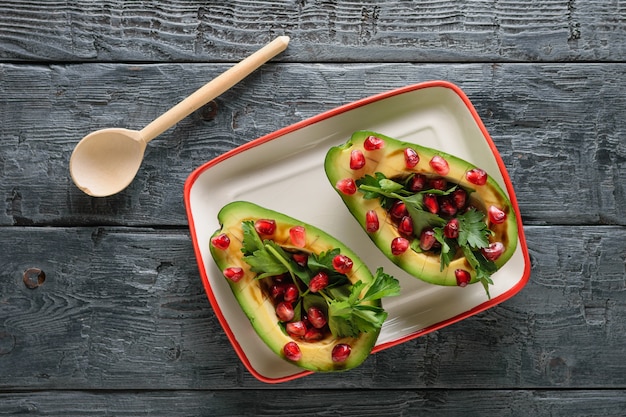
Incorporating protein powders and supplements
While whole foods should always be the foundation of any diet, vegan protein powders can be invaluable tools for bodybuilders looking to consistently hit high protein targets, especially when time is limited or variety is desired. They offer a concentrated source of protein with minimal fuss.
When selecting a vegan protein powder, look for blends that combine different plant sources (e.g., pea, rice, hemp, soy) to ensure a comprehensive amino acid profile. This multi-source approach mimics the benefits of consuming complementary proteins from whole foods.
- Pea Protein: High in BCAAs, easily digestible, and a good source of iron.
- Brown Rice Protein: Hypoallergenic, but often lower in lysine unless combined with other proteins.
- Hemp Protein: Contains all essential amino acids, rich in omega-3 and omega-6 fatty acids, and fiber.
- Soy Protein: A complete protein and highly effective for muscle growth, but some prefer to limit intake.
A single scoop of most vegan protein powders can provide 20-25 grams of protein, making it easy to reach or exceed the 30-gram per meal target when added to smoothies, oatmeal, or even certain savory dishes. Consider them a convenient supplement to your whole food intake, not a replacement.
Moreover, certain supplements like creatine or BCAAs (branched-chain amino acids) can further support muscle growth and recovery for vegan bodybuilders, though protein from whole foods and powders should remain the priority resource.
Top plant-based protein sources for bodybuilders
Building muscle on a vegan diet is highly achievable with the right knowledge of protein-rich plant foods. The diversity of options available allows for creative, fulfilling, and nutritionally dense meals. Beyond just protein, these foods offer a wealth of fiber, vitamins, and minerals crucial for an athlete’s well-being.
This section highlights some of the most effective plant-based protein sources, detailing their protein content and how they can be incorporated into your daily meals to consistently hit that 30-gram protein per meal target.
Legumes: the powerhouse of plant protein
Legumes, which include beans, lentils, chickpeas, and peas, are arguably the most versatile and protein-dense plant foods. They are also rich in complex carbohydrates and fiber, providing sustained energy and supporting digestive health, both vital for active individuals.
- Lentils: Approximately 18 grams of protein per cooked cup. Excellent in soups, stews, curries, or as a base for vegan “meat” loaf.
- Black Beans: Roughly 15 grams of protein per cooked cup. Perfect for tacos, burritos, chili, or as a side dish.
- Chickpeas (Garbanzo Beans): Around 15 grams of protein per cooked cup. Ideal for hummus, roasted as a snack, or added to salads and curries.
- Edamame: About 18 grams of protein per cooked cup. A great snack, or addition to stir-fries and salads.
Incorporating generous servings of these legumes into your main meals can easily contribute 15-20 grams of protein, leaving you to add another protein source to reach the 30-gram target.
Their affordability and long shelf life also make them highly accessible and practical for consistent consumption.
Soy products: versatile and complete proteins
Soy-based foods like tofu, tempeh, and edamame are complete proteins, meaning they contain all nine essential amino acids. This makes them exceptionally valuable for vegan bodybuilders seeking efficient muscle protein synthesis.
- Tofu: Protein content varies by firmness, but firm or extra-firm tofu offers about 10-12 grams of protein per 4 ounces. It’s incredibly versatile—marinate and bake, fry, scramble, or blend into sauces.
- Tempeh: Fermented soybean product with a firmer texture and nutty flavor, providing around 19 grams of protein per 4 ounces. Excellent crumbled into chili, sliced into sandwiches, or added to stir-fries.
- Soy Milk: Around 8 grams of protein per cup. Great in smoothies, oatmeal, or as a standalone beverage.
These soy products are staples for many vegan athletes due to their high protein content and adaptability in various dishes, making it easier to integrate them across multiple meals throughout the day.
They are also often fortified with calcium and vitamin D, adding to their nutritional benefits.
Grains and seeds: adding a protein punch
While often recognized for their carbohydrate content, certain grains and seeds are surprisingly good sources of protein and can significantly boost the amino acid profile of a meal when combined with legumes or other plant proteins.
- Quinoa: Unique among grains as a complete protein, offering about 8 grams of protein per cooked cup. Great as a base for bowls, salads, or a side dish.
- Oats: About 5 grams of protein per half-cup dry. Ideal for a protein-packed breakfast when combined with plant milk and protein powder.
- Hemp Seeds: An excellent source of protein, providing around 10 grams per 3 tablespoons. Sprinkle on salads, add to smoothies, or use in energy bites.
- Chia Seeds: While smaller in protein (about 5 grams per 2 tablespoons), they are rich in fiber and omega-3s, and can be used to thicken smoothies or overnight oats.
- Other Nuts and Seeds: Almonds, walnuts, pumpkin seeds, and sunflower seeds all contribute protein and healthy fats, suitable for snacking or adding to meals.
Incorporating these into your meals, perhaps as part of a buddha bowl with legumes and vegetables, or a protein-fruit smoothie, makes it simpler to ensure you’re consistently hitting your protein targets throughout the day.
Meal planning and timing for optimal protein intake
Beyond simply knowing which foods are rich in protein, a strategic approach to meal planning and timing is essential for vegan bodybuilders aiming for consistent muscle growth. This involves distributing protein intake effectively across the day to maximize muscle protein synthesis and recovery.
Proper timing ensures a steady supply of amino acids, particularly around training sessions, when the body’s demand for protein is highest.
Distributing protein across meals
To consistently hit 30 grams of protein per meal, it’s beneficial to think about each meal as an opportunity to stack protein-rich foods. Instead of aiming for one large protein hit, distribute your intake across 4-6 meals or snacks throughout the day.
- Breakfast: Start strong with a protein-heavy meal. Think tofu scramble with black beans, or a protein powder smoothie with oats and nuts.
- Lunch: A large salad with lentils and chickpeas, or a tempeh sandwich on whole-grain bread.
- Dinner: A generous serving of lentil pasta with nutritional yeast, or a hearty bean chili.
- Snacks: Roasted chickpeas, a handful of almonds, or a small protein shake.
This consistent protein supply helps maintain a positive nitrogen balance, which is crucial for muscle building and preventing catabolism. Eating consistently also helps manage hunger and energy levels throughout the day.
Planning meals in advance, perhaps through batch cooking on weekends, can significantly simplify the process of consistently hitting your protein targets and reduces the likelihood of resorting to less nutritious options when hunger strikes.
Pre and post-workout nutrition
The timing of protein intake around workouts is a subject of much discussion, but a general consensus supports consuming protein and carbohydrates before and after training sessions to optimize performance and recovery. While the “anabolic window” might be wider than once thought, timely nutrition is still beneficial.
Pre-workout: Consuming a meal or snack containing protein and carbohydrates 1-3 hours before a workout provides sustained energy and amino acids. An example could be a small portion of oatmeal with protein powder and fruit.
Post-workout: Within an hour or two after training, a meal rich in both protein and carbohydrates is ideal for replenishing glycogen stores and initiating muscle repair. A substantial meal or a protein shake combined with easily digestible carbohydrates would be suitable.
Focus on whole food sources as much as possible, as they also provide essential micronutrients. However, protein shakes can be a practical solution post-workout if a solid meal isn’t immediately feasible.
Addressing common vegan bodybuilding nutrition challenges
While vegan bodybuilding is entirely viable, it’s important to acknowledge and address specific challenges that may arise. These often relate to nutrient deficiencies common in poorly planned vegan diets, or simply the logistical hurdles of consuming adequate calories and protein.
Proactive planning and awareness can easily overcome these obstacles, ensuring a healthy and successful bodybuilding journey on a plant-based diet.
Ensuring adequate calorie intake
Muscle growth requires not only sufficient protein but also an overall caloric surplus. Plant-based foods, especially whole foods, are often very filling due to their fiber content, which can sometimes make it challenging for bodybuilders to consume enough calories to support growth.
To overcome this, focus on nutrient-dense, calorie-rich plant foods:
- Higher-fat plant foods: Avocados, nuts, seeds, and nut butters are excellent sources of healthy fats and calories.
- Complex carbohydrates: Potatoes, sweet potatoes, whole grains (oats, quinoa, brown rice) provide energy without excessive bulk.
- Additives: Incorporate healthy oils (olive, coconut) into cooking, and use full-fat plant milks.
Tracking your food intake initially for a few days can provide valuable insight into whether you’re meeting your caloric demands and help you identify areas where you might need to adjust your portion sizes or add more calorie-dense options.
Addressing micronutrient concerns
Certain micronutrients warrant extra attention on a vegan diet to ensure optimal health and performance. While a diverse vegan diet can provide most nutrients, some are harder to obtain or have lower bioavailability.
- Vitamin B12: This vitamin is not found in plants and must be supplemented. It’s crucial for nerve function and red blood cell formation.
- Vitamin D: While some is obtained from sun exposure, supplementation is often recommended, especially in regions with limited sunlight or during winter months.
- Iron: Plant-based iron (non-heme) is less readily absorbed than heme iron from animal sources. Pair iron-rich plant foods (lentils, spinach, fortified cereals) with Vitamin C sources (citrus, bell peppers) to enhance absorption.
- Calcium: Abundant in fortified plant milks, tofu set with calcium, leafy greens, and sesame seeds.
- Omega-3 Fatty Acids: Algae-based DHA/EPA supplements are the most reliable source for vegans. Flaxseeds, chia seeds, and walnuts provide ALA, which the body converts to DHA/EPA, but conversion rates can be low.
- Iodine: Found in iodized salt and sea vegetables (use in moderation).
- Zinc: Present in legumes, nuts, seeds, and whole grains. Soaking and sprouting can improve absorption.
Regular blood tests can help identify any specific deficiencies, allowing for targeted dietary adjustments or supplementation. Consulting with a plant-based dietitian or a knowledgeable healthcare professional can provide personalized guidance.
Sample vegan bodybuilding meal plan for 30g protein per meal
Putting theory into practice is essential for success in vegan bodybuilding. A sample meal plan demonstrates how to consistently achieve 30 grams of protein per meal using diverse, delicious, and nutrient-dense plant-based foods. This plan serves as a template; portion sizes and specific foods can be adjusted based on individual caloric and macronutrient needs.
The goal is to show the feasibility and variety available when constructing a high-protein vegan diet for muscle gain.
Daily meal breakdown
This sample plan provides approximate protein counts per meal. Remember to adjust quantities based on your specific body weight, training intensity, and overall daily protein targets.
- Meal 1 (Breakfast, ~35g protein):
- Tofu Scramble (1 cup firm tofu, crumbled)
- 1/2 cup Black Beans
- 1 cup Spinach (sautéed)
- 1 slice Whole Grain Toast with 2 tbsp Nutritional Yeast
- Meal 2 (Lunch, ~38g protein):
- Large Lentil and Quinoa Salad (1.5 cups cooked lentils, 1 cup cooked quinoa)
- Mixed Greens and Veggies
- 4 tbsp Hemp Seeds
- Tahini Dressing
- Meal 3 (Pre-Workout Snack, ~30g protein):
- Vegan Protein Shake (1.5 scoops pea/rice protein blend)
- 1 cup Fortified Soy Milk
- 1 banana
- 2 tbsp Almond Butter
- Meal 4 (Post-Workout Dinner, ~40g protein):
- Tempeh and Veggie Stir-fry (6 oz tempeh)
- 2 cups Mixed Vegetables (broccoli, bell peppers)
- 1.5 cups Brown Rice
- Soy-Ginger Sauce
- Meal 5 (Evening Snack, ~25g protein):
- Chana Masala (chickpea curry, 1 cup)
- Small side of whole-grain flatbread
This example demonstrates how to integrate various plant protein sources into meals, ensuring a consistent supply of amino acids throughout the day. It highlights the importance of combining legumes, soy products, grains, and seeds to meet ambitious protein targets.
Hydration is also crucial throughout the day, so ensure you’re drinking plenty of water.
Cooking and preparation tips for protein-packed vegan meals
Successfully adhering to a high-protein vegan bodybuilding diet isn’t just about knowing what to eat, but also how to prepare it efficiently and deliciously. Practical cooking and preparation strategies can make the difference between a sustainable meal plan and one that quickly becomes overwhelming.
These tips focus on maximizing protein content, enhancing flavor, and streamlining your time in the kitchen.
Batch cooking and meal prepping
One of the most effective strategies for vegan bodybuilders is to dedicate time to batch cooking and meal prepping. This ensures you always have high-protein meals and components readily available, reducing the temptation for less nutritious, convenient options.
- Cook Grains and Legumes in Bulk: Prepare large quantities of cooked quinoa, brown rice, lentils, and beans at the beginning of the week. Store them in airtight containers for quick additions to meals.
- Prepare Protein Sources: Marinate and bake/fry large batches of tofu or tempeh, or make a big batch of vegan chili or lentil soup.
- Chop Vegetables: Pre-chop vegetables for stir-fries, salads, or snacks to save time during busy weeknights.
Having ready-to-assemble components makes it easy to quickly put together a high-protein meal, even on days when energy or time is limited.
Investing in good quality food storage containers will also streamline this process.
Flavor enhancement and variety
A common misconception about high-protein vegan diets is that they are bland or restrictive. On the contrary, the array of plant-based ingredients allows for incredible culinary creativity. Flavor is crucial for adherence to any diet.
- Herbs and Spices: Don’t shy away from generous use of herbs and spices. Cumin, coriander, turmeric, smoked paprika, garlic powder, and onion powder can transform simple ingredients.
- Umami Boosters: Nutritional yeast (often nicknamed “nooch”) adds a cheesy, savory flavor and extra protein. Miso paste, soy sauce/tamari, and sun-dried tomatoes also contribute rich umami.
- Vinegars and Citrus: A squeeze of lemon or lime, or a splash of apple cider vinegar, can brighten flavors.
- Healthy Fats: A drizzle of olive oil, avocado, or a spoonful of nut butter not only adds healthy calories but significantly enhances flavor and mouthfeel.
Experiment with different cuisines—Indian curries, Mexican bowls, Mediterranean salads, Asian stir-fries—to keep your meals exciting and diverse. Variety in preparation methods (roasting, grilling, baking, sautéing) also impacts flavor and texture, preventing meal fatigue.
Remember that a diet you enjoy is a diet you can stick to long-term, which is essential for consistent progress in bodybuilding.
| Key Point | Brief Description |
|---|---|
| 🌱 Protein Diversity | Combine sources like legumes, soy, grains for full amino acid profile. |
| 💪 30g/Meal Target | Aim for 30g+ protein per meal to optimize muscle protein synthesis. |
| ⏰ Timing & Planning | Distribute intake across meals; utilize pre/post-workout nutrition. |
| 🔋 Micronutrient Focus | Pay attention to B12, D, Iron, Calcium, Omega-3s, Zinc, Iodine. |
Frequently asked questions about vegan bodybuilding nutrition
▼
Absolutely. Numerous vegan athletes and bodybuilders have demonstrated that significant muscle mass can be built and maintained on a plant-based diet. The key is to consume sufficient calories, ample protein from diverse plant sources, and engage in consistent, challenging strength training, just like any other bodybuilder aiming for muscle hypertrophy and strength gains.
▼
Not necessarily. While individual plant proteins may lack one or more essential amino acids, the body’s amino acid pool allows for “complementary” proteins to be consumed over the course of a day. Focusing on a diverse intake of whole plant foods over 24 hours is more important than achieving a “complete” protein profile at every single meal for optimal muscle protein synthesis.
▼
Vegan protein shakes are a convenient way to boost protein intake, especially around workouts or when whole food options are limited. They are particularly useful for easily hitting higher protein targets, like 30 grams per meal. While not strictly mandatory, they can significantly simplify meal planning and ensure consistent protein availability to support muscle growth and recovery effectively.
▼
To hit 30g of protein, focus on larger servings of legumes (lentils, black beans, chickpeas), soy products (tofu, tempeh, edamame), and supplementing with plant-based protein powders. A large bowl of lentil pasta with nutritional yeast, or a tofu and tempeh scramble, are excellent examples of meals that can easily provide this amount of protein, supporting daily protein goals effectively.
▼
With careful planning, most nutrients are adequately covered. However, Vitamin B12 is crucial and requires supplementation as it’s not found in plants. Vitamin D, Omega-3s (DHA/EPA), Iron, Zinc, and Iodine may also need attention, often through fortified foods or targeted supplements, to ensure optimal health and performance for dedicated vegan bodybuilders consistently.
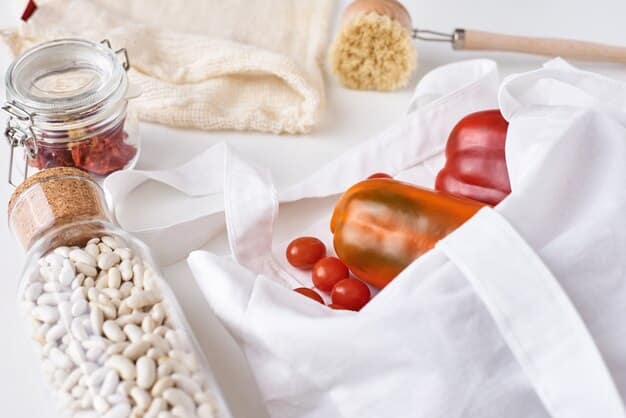
Conclusion
Embracing a vegan diet for bodybuilding is more than a dietary choice; it’s a commitment that, when executed thoughtfully, can lead to impressive strength gains and muscle development. The emphasis on achieving an average of 30 grams of protein per meal is a highly effective strategy to support muscle protein synthesis, optimize recovery, and ensure steady progress. By leveraging the vast array of protein-rich plant foods—from legumes and soy products to diverse grains and seeds—and employing smart meal planning and preparation techniques, vegan bodybuilders can not only meet but exceed their nutritional requirements. This guide underscores that a plant-based path to muscle is not only viable but can be incredibly nutrient-dense, satisfying, and sustainable, pushing past conventional notions of bodybuilding nutrition.
